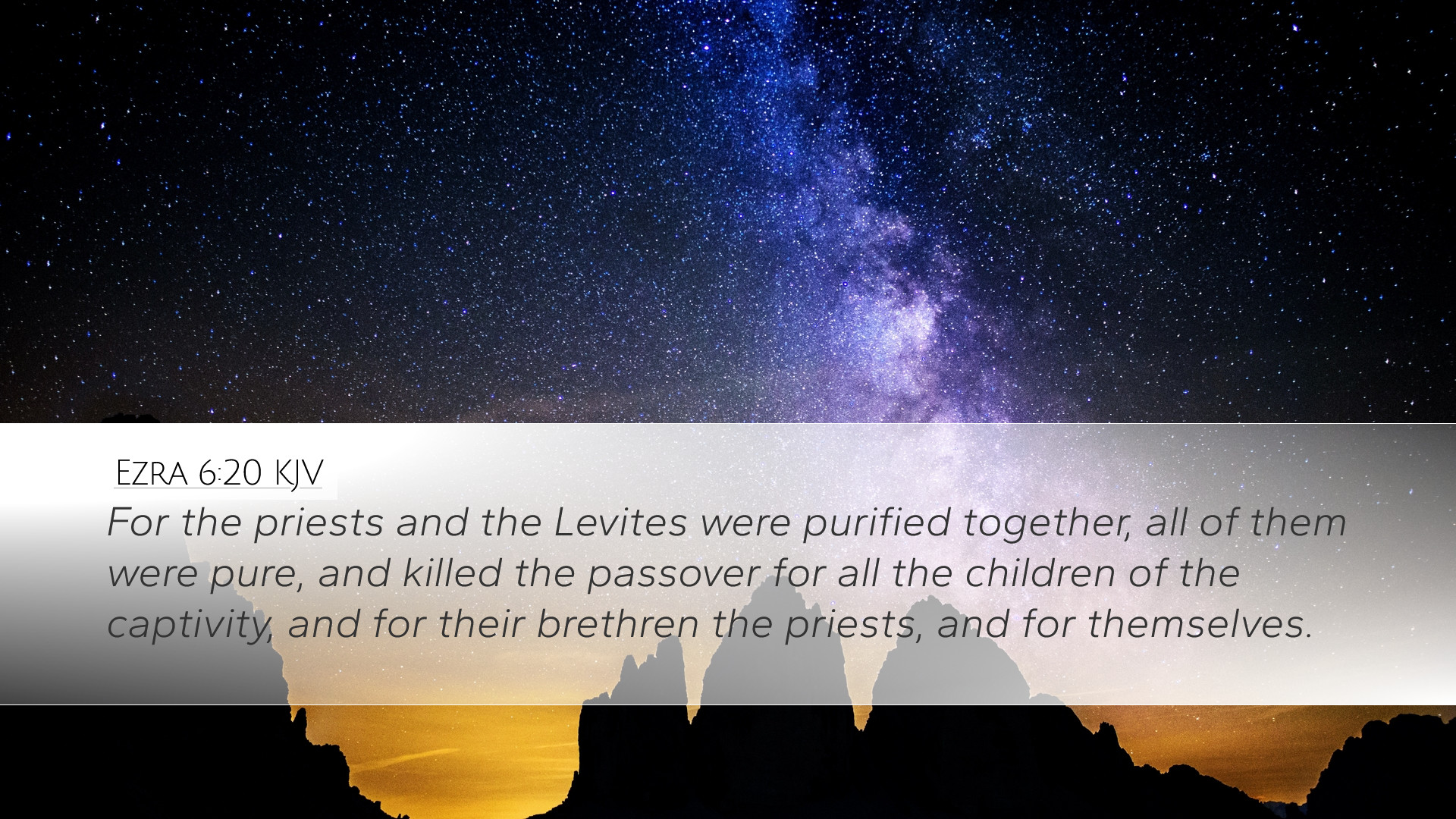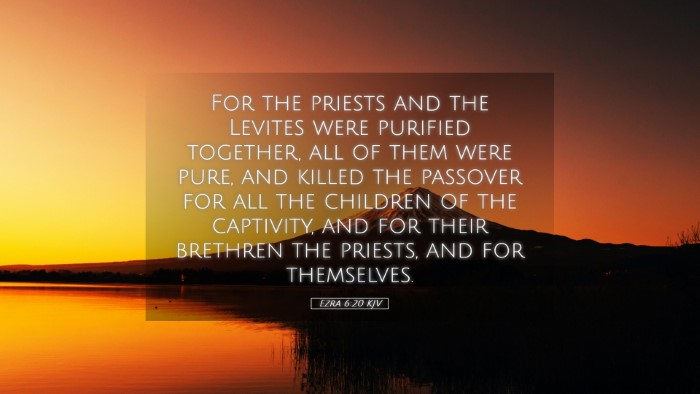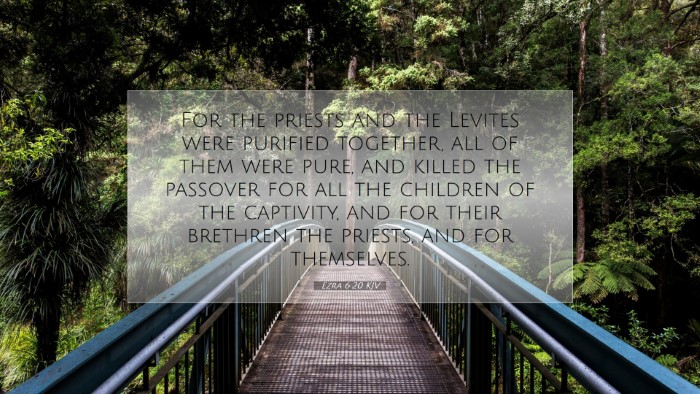Old Testament
Genesis Exodus Leviticus Numbers Deuteronomy Joshua Judges Ruth 1 Samuel 2 Samuel 1 Kings 2 Kings 1 Chronicles 2 Chronicles Ezra Nehemiah Esther Job Psalms Proverbs Ecclesiastes Song of Solomon Isaiah Jeremiah Lamentations Ezekiel Daniel Hosea Joel Amos Obadiah Jonah Micah Nahum Habakkuk Zephaniah Haggai Zechariah MalachiEzra 6:20
Ezra 6:20 KJV
For the priests and the Levites were purified together, all of them were pure, and killed the passover for all the children of the captivity, and for their brethren the priests, and for themselves.
Ezra 6:20 Bible Commentary
Commentary on Ezra 6:20
Verse Context: Ezra 6:20 states, “For the priests and the Levites had purified themselves together; all of them were pure: and they killed the passover for all the children of the captivity, and for their brethren the priests, and for themselves.” This verse occurs within a significant historical period during the return of the Israelites from Babylonian captivity and highlights an important ritual observance.
Historical Background
The context of this scripture unfolds during the time of the rebuilding of the Temple in Jerusalem, as documented in the book of Ezra. After the Babylonian exile, a remnant of Israel was allowed to return to their homeland to restore their religious practices and national identity.
The Passover was a pivotal observance in Israel's religious life, commemorating God's deliverance of the Israelites from slavery in Egypt. In this historical moment, the celebration of Passover represented both a physical and spiritual restoration for the returning exiles.
Interpretation and Insights from Commentators
Matthew Henry's Commentary
Matthew Henry's insight emphasizes the significance of purity before engaging in sacred duties. He notes that the priests and Levites’ purification is a symbolic act representing their readiness to serve God. The collective purification highlights community and the necessity of holiness when approaching God.
Henry also draws an important connection between this purification and communal worship, stating that their act of killing the Passover lamb demonstrates unity. Together, they ensure that every community member, including the children of captivity, receives the blessings of God’s salvation.
Albert Barnes' Notes
Albert Barnes focuses on the procedural aspect of the Passover observance as presented in this verse. He points out that the organization of the celebration reflects adherence to the Law of Moses. The priests and Levites, as designated leaders, exemplify the importance of leadership in worship and sacrificial rites.
Barnes also highlights the inclusiveness of this celebration. It extends beyond the Levites and priests to include all the children of captivity. This inclusiveness speaks to God’s mercy and the restoration of His people. Barnes elaborates that the act of killing the Passover lamb emphasizes the need for sacrifice to maintain fellowship with God.
Adam Clarke's Commentary
Adam Clarke provides an analysis of the ritual's implications in a theological context. He notes that the purification process undertaken by the priests and Levites is not just a ceremonial requirement; it signifies a deeper spiritual renewal among the people. Clarke asserts that the act of preparation demonstrates that approaching God is a serious matter, requiring personal and communal holiness.
Clarke also stresses the importance of the Passover in re-establishing the identity of the Israelites. The observance is not merely a tradition; it represents a reclaiming of their covenant relationship with God. Clarke argues that the dedication and unity displayed in the observance serve as a model for contemporary worship practices.
Theological Implications
This verse encapsulates crucial theological themes relevant for pastors and theologians today:
- Holiness: The necessity of purification reflects the broader biblical principle that God requires holiness from those who serve Him.
- Community in Worship: The unified action of the priests, Levites, and the people suggests that worship and religious observance are communal activities, vital for the life of the church.
- Inclusivity of God's Grace: The mention of the children of captivity illustrates God's willingness to embrace all who return to Him, regardless of their past, which is vital in the message of the Gospel.
- Historical Continuity: By performing the Passover, the Israelites remember their history and identity, which encourages the modern church to reflect on its heritage and mission.
Application for Today
For pastors, students, and scholars, the lessons drawn from Ezra 6:20 invite deep reflection on worship practices and the importance of preparation in engaging with God:
- Preparation for Worship: Just as the priests and Levites purified themselves, today's believers are called to prepare their hearts and minds for worship.
- Leadership Responsibility: Church leaders must exemplify holiness and guide their congregations in righteous paths, encouraging collective spiritual growth.
- Covenantal Reminder: The observance serves as a powerful reminder of God's faithfulness and the significance of salvation, which should be regularly celebrated within congregations.
- Reflection on Community: Believers should foster a sense of community that embraces and welcomes others, reflecting God's grace and forgiveness.
Conclusion
In summarizing the content of Ezra 6:20 through the lenses of noted Bible commentators, we witness a profound moment in the life of Israel that speaks to the core tenets of faith—holiness, community, and God’s grace. As we prepare to worship and align our lives with the teachings of scripture, we are reminded of the importance of purification and the need for sacrificial love in our community.


